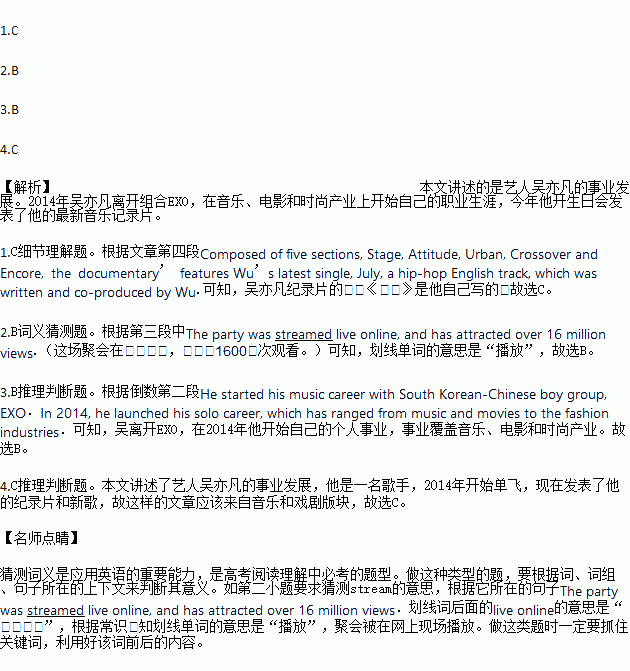题目内容
Wu celebrates birthday with return to music career
Chinese-Canadian singer-actor Wu Yi fan, known to his fans as Kris Wu, has released a documentary(纪录片) that goes backstage at his 26th birthday party.
The documentary S.A.U.C.E was recorded at his fans meeting party, held earlier this month in Shanghai to celebrate Wu's birthday.
The party was streamed live online, and has attracted over 16 million views.
Composed of five sections, Stage, Attitude, Urban, Crossover and Encore, the documentary’ features Wu’s latest single, July, a hip-hop English track, which was written and co-produced by Wu.
The single also marks Wu’s return to music after starring in big selling movies, including Mr. six by director Feng Xiao gang and The Mermaid by director Stephen Chow.
Born in Guang zhou, Guangdong province, Wu immigrated(移民) to Vancouver at ten years old with his mother.
He started his music career with South Korean-Chinese boy group, EXO.
In 2014, he launched his solo career, which has ranged from music and movies to the fashion industries.
After making his first appearance on the runway for Burberry men's collections in London, Wu was selected as the British luxury brand’s first non-British ambassador.

1.What can we know about Wu Yi fan according to the passage?
A. Wu has released a documentary that goes backstage at his 16th birthday party.
B. Wu immigrated to Canada at ten years old with his father.
C. Wu played an important part in producing his latest single, July.
D. Wu was selected as the British luxury brand’s last non-British ambassador.
2.Which of the following can replace the underlined word “stream” in Paragraph 3?
A. perform. B. broadcast. C. hold. D. celebrate.
3.What can we infer about Wu’s career?
A. Wu started his music career with South Korean boy group EXO.
B. Wu left EXO and began his own career in music, movies and the fashion industries.
C. Wu has been singing since he started his music career.
D. Wu returned to music before he released his latest single.
4.In which section of a newspaper can we read this passage?
A. Film and TV. B. Books. C. Music and Theater. D. Events and Festivals.
 夺冠金卷全能练考系列答案
夺冠金卷全能练考系列答案
